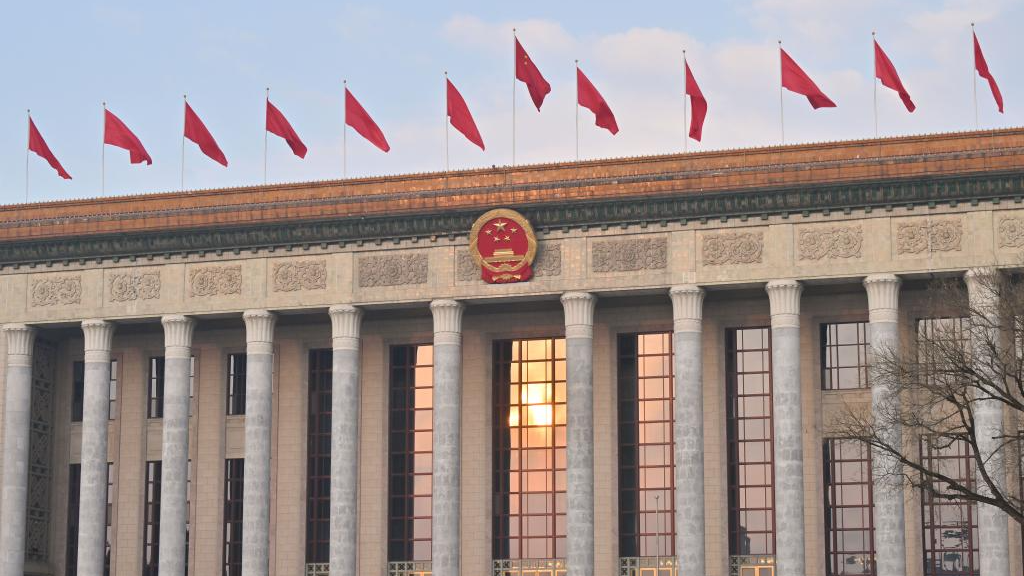
The Great Hall of the People in Beijing, China, March 5, 2025. /Xinhua
Editor's note: Bai Lu, a special commentator on current affairs for CGTN, is a researcher and division director at the Research Center for Xi Jinping Thought on Socialism with Chinese Characteristics for a New Era under the Party School of the CPC Central Committee (National Academy of Governance). The article reflects the author's views and not necessarily those of CGTN.
To govern the country, the ruling party must be governed first; to govern the ruling party, there must be strict discipline; and that discipline must be based in the law.
In China, unchecked habits and rituals bred questionable practices in the Communist Party of China (CPC) in the past. To address them, in 2012, soon after the 18th CPC National Congress, the Party Central Committee issued the "Eight-Point Decision on Improving Party and Government Conduct and Building Closer Ties with the People," the first major piece of CPC regulation in the new era.
The eight-point decision addressed the maladies in style and conduct, produced immediate results in official conduct and political culture, and established credibility. Social and civic ethos improved, obstacles were cleared, and consensus was achieved, laying the groundwork for more systematic institution-building.
Short-term results are easy, but ensuing long-term discipline is hard. President Xi Jinping, also general secretary of the CPC Central Committee, has repeatedly stressed that improving the Party's work style needs more than one-off campaigns; it needs institutional mechanisms. As he put it, the key is to "solve problems by fixing the system and look to the decision for lasting effect."
Implementing the decision was also on the agenda of the Political Bureaus of both the 19th and 20th CPC Central Committee at their very first meeting. The Regulations on CPC Disciplinary Action and the Provisions on Handling Party Organization Affairs (Trial) list violations of the decision as key issues for investigation and punishment.
The goal is not just to change behavior for the moment, but to consolidate the achievements through the decision. The decision was the starting point for strengthening the top-level design in accordance with the principle of "comprehensive law and effective implementation."
Oversight was tightened across all areas prone to poor conduct and corruption, such as official banquets, welfare perks and business trips and reimbursements. A series of regulations were rolled out, each linked to the decision, reinforcing each other. Red lines were drawn across every link in the chain of power and every area where poor conduct might arise. What was once a loose patchwork grew into a robust prevention mechanism that makes misconduct structurally impossible.
In governance, the real challenge is not writing the decision, but making sure they are obeyed. However perfect a system may look on paper, if it is not enforced, it is nothing more than a paper tiger. The real test of the eight-point decision is whether it will prove to be short-lived and symbolic or a "high-voltage line" that no one dares to cross.

A sculpture of the Communist Party of China flag at the Museum of the Communist Party of China in Beijing, July 1, 2023. /CFP
Xi set the tone by leading from the front, not just talking the decision but living it. In doing so, he set a model for the entire Party. Over the past decade, rule-making and rule-enforcement have become inseparable, with tough discipline and accountability giving the decision both authority and effect.
The top target of disciplinary and supervisory bodies at all levels is any violation of the decision. As the "four maladies" – formalism, bureaucracy, hedonism and extravagance – tend to resurface in disguised or mutated forms, discipline and oversight are continuously improved to ensure the system remains effective.
Oversight has evolved from external checks to tech-driven monitoring, making enforcement quicker, more precise and more scientific. This has ensured firm enforcement and a powerful deterrent effect. Misconduct is not just punished but people fear to engage in it.
Disciplinary enforcement and accountability have reached a level of strictness never seen before. Anyone who defies the decision is not punished alone, each case triggers "dual investigation." Both the offender and the leader who fails in oversight duty are held responsible.
This has compelled all Party organizations and leaders to shoulder their responsibility for governing the Party strictly. It also ensures that enforcement percolates down every link in the chain. Step by step, this has created an atmosphere where people simply dare not break the decision.
"The further we go, the stricter we must be in enforcing the eight-point decision," Xi once said, sending an unmistakable signal that comprehensive discipline is non-negotiable, underscoring the Party's courage to carry its self-reform through, and reaffirming its commitment to the people.
Institutions enjoy long-term vitality only when the decision is internalized as values and habits. After more than a decade of relentless efforts, many things that once needed constant reminders have become second nature for Party officials.
The change is real. From not daring to break the decision, officials now genuinely have no desire to do so. Core values such as integrity, honesty, practicality and frugality have returned, reshaping the Party's internal political culture and winning people's support.
The eight-point decision is the spark that set off a prairie fire, promoting the construction and improvement of a comprehensive architecture of intra-Party rules. With the dual guarantee of rules and enforcement, the decision has been transformed from a short-term marching order into a long-term rule of life, providing solid institutional ballast for governing the Party with strict discipline.
Reforming official conduct and institution-building must never pause. With the eight-point decision as the foundation, the rulebook should be improved and enforcement strengthened, consolidating and extending the hard-won institutional gains. This will ensure that today's drive becomes an enduring foundation.
(If you want to contribute and have specific expertise, please contact us at opinions@cgtn.com. Follow @thouse_opinions on X, formerly Twitter, to discover the latest commentaries in the CGTN Opinion Section.)